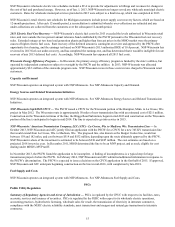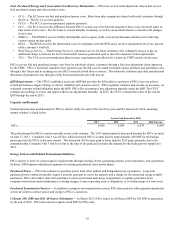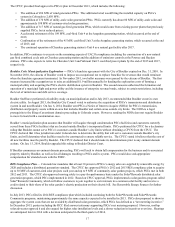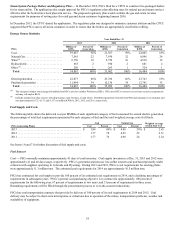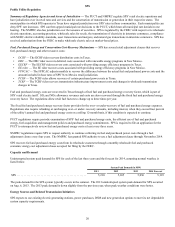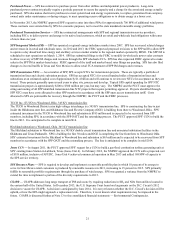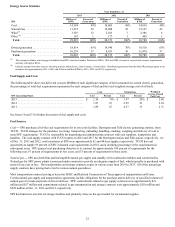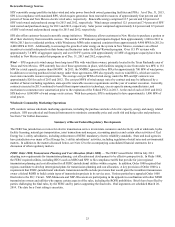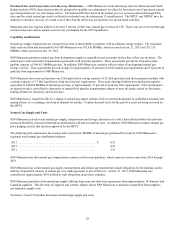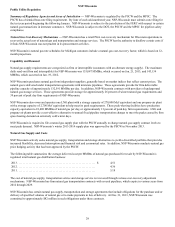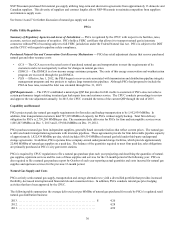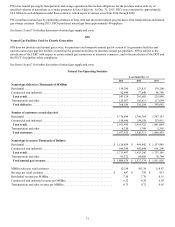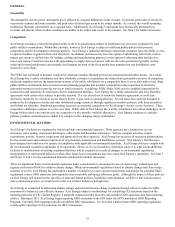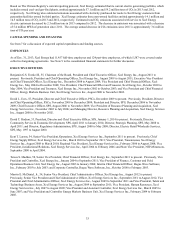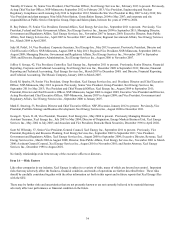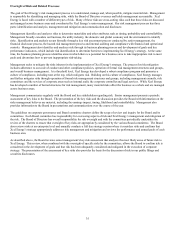Xcel Energy 2013 Annual Report Download - page 43
Download and view the complete annual report
Please find page 43 of the 2013 Xcel Energy annual report below. You can navigate through the pages in the report by either clicking on the pages listed below, or by using the keyword search tool below to find specific information within the annual report.25
ATC vs. Xcel Energy Services Inc. and MISO (Hampton, Minn. to Rochester, Minn. to La Crosse, Wis. Transmission Line) — In
October 2012, ATC filed a complaint against MISO, Xcel Energy Services Inc., NSP-Minnesota and NSP-Wisconsin, alleging that,
under the legal principles set forth in the July 2012 FERC ruling in the La Crosse, Wis. to Madison, Wis. transmission line complaint
filed by Xcel Energy Services Inc. and NSP-Wisconsin against ATC, that the FERC should determine that MISO should have
designated the Hampton, Minn. to Rochester, Minn. to La Crosse, Wis. CapX2020 line and the La Crosse, Wis. to Madison, Wis. line
as a single facility under the MISO Transmission Owners Agreement and Tariff. Thus, ATC should have been designated as the owner
of the La Crosse, Wis. to Madison, Wis. line portion of the purported single facility. Xcel Energy filed an answer seeking dismissal of
the ATC complaint in October 2012. On Feb. 4, 2013, the FERC issued an order denying the ATC complaint. The FERC found that
MISO properly applied its planning process and that Hampton, Minn. to La Crosse, Wis. and the La Crosse, Wis. to Madison, Wis.
lines are separate. ATC did not seek rehearing and therefore the FERC order is final and MISO’s prior ownership decisions stand,
which brings this matter to a close.
MISO Transmission Pricing — The MISO Tariff presently provides for different allocation methods for the costs of new transmission
investments depending on whether the project is primarily local or regional in nature. If a project qualifies as a MVP, the costs would
be fully allocated to all loads in the MISO region. MVP eligibility is generally obtained for higher voltage (345 KV and higher)
projects expected to serve multiple purposes such as improved reliability, reduced congestion, transmission for renewable energy and
load serving. Certain parties appealed the FERC MVP tariff orders to the U.S. Court of Appeals for the Seventh Circuit (Seventh
Circuit). In June 2013, the Seventh Circuit upheld the FERC MVP tariff orders allocating MVP project costs regionally, but remanded
the FERC decision to not apply the regional charge to transmission service transactions crossing into the PJM RTO. U.S. Supreme
Court review of the Seventh Circuit decision has been requested and the response is pending. The NSP System has certain new
transmission facilities for which other customers in MISO contribute to cost recovery. Likewise, the NSP System also pays a share of
the costs of projects constructed by other transmission owning entities. The transmission revenues received by the NSP System from
MISO and the transmission charges paid to MISO associated with projects subject to regional cost allocation could be significant in
future periods.
RSG Charges — The MISO tariff charges certain market participants a real-time RSG charge, designed to ensure that any generator
scheduled or dispatched by MISO receives no less than its offer price for start-up, no-load and incremental energy. In August 2010,
the FERC issued two orders relating to RSG charge exemptions and the allocation of the RSG costs among MISO participants. The
FERC has allowed allocating a greater portion of the RSG costs related to resources committed for voltage and local reliability
requirements to the market participants serving the loads that benefit from such commitments. Certain of the FERC’s orders remain
pending on rehearing. An appeal to the D.C. Circuit has been held in abeyance, pending the FERC’s disposition of rehearing requests.
If the FERC were to reverse or modify the prior orders on rehearing, the NSP system could be subject to additional RSG charges for
prior periods. NSP-Minnesota is permitted to recover the RSG costs through FCA mechanisms. NSP-Wisconsin recovers RSG costs
in its fuel and purchased energy recovery mechanism in Wisconsin and through its power supply cost recovery mechanism in
Michigan.
MISO ROE Complaint — In November 2013, a group of customers filed a complaint at the FERC against all FERC jurisdictional
MISO transmission owners, including NSP-Minnesota and NSP-Wisconsin. The complaint argues for a reduction in the ROE
applicable to transmission formula rates in the MISO region from 12.38 percent to 9.15 percent, a prohibition on capital structures in
excess of 50 percent equity, and the removal of ROE adders (including those for RTO membership and being an independent
transmission company), effective Nov. 12, 2013. In January 2014, Xcel Energy Services, Inc. filed an answer to the complaint
asserting that the 9.15 percent ROE would be unreasonable and that the complainants failed to demonstrate the NSP System equity
capital structure was unreasonable. The MISO Transmission Owners separately answered the complaint, arguing the complainants do
not have standing to challenge the MISO Tariff provisions, have not met their burden of proof to demonstrate that the current FERC-
approved ROE, capital structure and other incentives are unjust and unreasonable, and the complaint should be dismissed. Other
parties filed comments supporting a reduction in the MISO regional ROE, the equity capital structure limitations, and limits on ROE
incentives, and supported the proposed effective date. In January 2014, the complainants filed an answer to the MISO Transmission
Owners’ motion to dismiss. The complaint is pending FERC action. The estimated impact of FERC granting the complaint could
amount to a reduction of revenue of $11.7 million annually for NSP-Minnesota and NSP-Wisconsin. NSP-Minnesota and NSP-
Wisconsin would seek to offset any reduction in wholesale revenues through increases in retail rates.


